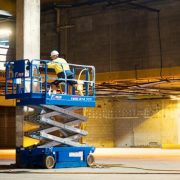Safety Tip of the Week: Easy on Those Controls!
Every six months, the International Powered Access Federation (IPAF) releases its sobering statistics on the accidents that occur worldwide during the use of mobile elevated work platforms (MEWPs). Its latest report, back in September, listed 23 casualties worldwide based on the reports volunteered by the industry. One of these casualties was in Australia. Force is committed to zero harm, and although MEWPs have a good and improving safety record, 23 casualties is 23 too many.
From boom lift hire to travel towers, there are obvious and inherent dangers in the use of MEWPs, but it’s clear that, given how widespread their use is, unsafe operation is the exception, not the rule. So what does cause these accidents, and how can Force and its customers avoid them?
Keeping Control
Some of these accidents are caused by ineffective operation of controls; generally small lapses of concentration or minor mistakes that can have dramatic consequences. While it’s very difficult if not impossible to completely eradicate human error, it is possible to avoid foreseeable errors.
Research in 2013 from the UK, a meta-analysis of data like that presented by IPAF, indicated that more than 20% of fatalities on MEWPs were caused by the incorrect or inappropriate use of controls. As well as directly attributable errors, collisions with overhead structures can be a result of inappropriate use of controls, directing the access equipment into an overhead obstruction, when the intention was to move the device forwards or backwards.
On larger equipment, extra weight can have an impact on inertia, with heavier boom platforms less manoeuvrable and more challenging to control. Training is critical to ensure operators are familiar with controls, not just on a group of machines but on each specific machine used.
Control Designed In
Although modern access equipment is intended to offer intuitive operation, there are substantial differences between models, and therefore it is vital that workers are completely comfortable with the control systems. At Force, our in-house trainers offer yellow card certification to operators of all MEWPs under 11 metres in height.
Something that can take customers by surprise when considering telehandlers hire is how many more functions these devices have in comparison to conventional scissor lifts. In many cases, equipment designers have begun to develop control panels that design out potential errors, for example, raised areas close to switches to avoid them being inadvertently pressed down for extended periods if the operator leans over the panel.
Without substantial cooperation between manufacturers, it is impossible to avoid one cause of error: variation in control panel design. This may lead to slips when a worker is used to the look and operation of one control panel but is then required to operate another machine. For example different knuckle booms, have controls in similar locations but with different functions.
Safe operation, considerate and mindful usage and awareness of hazards and speed are essential skills for handlers of all access equipment. Without these skills, there is no true control and therefore no safety. Keep safe and keep control over your controls.



